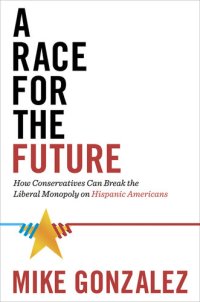
Ebook: A Race for the Future: How Conservatives Can Break the Liberal Monopoly on Hispanic Americans
Author: Mike Gonzalez
- Tags: Politics, Sociology, Nonfiction, POL042020, POL046000, SOC044000
- Year: 2014
- Publisher: The Crown Publishing Group
- Language: English
- epub
A landmark work examining the impact of Hispanic immigration on American politics, with a blueprint for what conservatives must do to recapture the American electorate.
Since 1965, millions of people have come to this country from Latin America and the Caribbean, seeking freedom and the chance to make a better life. Now accounting for more than 16 percent of the population, Hispanics have emerged as a decisive voting bloc that overwhelmingly skews liberal as they influence pivotal electoral races. But it doesn’t have to be that way forever.
In A Race for the Future, Mike Gonzalez describes what the term Hispanic means, correcting the erroneous assumption that it is a homogenous group and presenting an un- varnished look at the challenges each nationality—Mexican, Puerto Rican, Dominican, and many others—faces in America.
Despite their growing political power, Hispanics have largely been kept separate from mainstream America, and many of them are consigned to an underclass status. A Race for the Future reveals exactly how bureaucratic decisions that encourage public assistance and discourage assimilation hinder Hispanics and allow them to be politically monopolized by progressives.
Gonzalez shows how conservatives can begin to reverse this damaging trajectory by supporting policies that would help Hispanics thrive—education choice, family values, and financial freedom.
By returning to their core values of community, industry, and independence, conservatives can actively court the vital Hispanic vote. The fate of too many key battleground states, from Texas to Florida—analyzed in depth here—depends on the Right’s ability to successfully do just that.
A powerful take on a rapidly changing and diverse community, A Race for the Future is a much-needed course correction on how our country can successfully enable Hispanics to flourish while standing firm on our principles.
Since 1965, millions of people have come to this country from Latin America and the Caribbean, seeking freedom and the chance to make a better life. Now accounting for more than 16 percent of the population, Hispanics have emerged as a decisive voting bloc that overwhelmingly skews liberal as they influence pivotal electoral races. But it doesn’t have to be that way forever.
In A Race for the Future, Mike Gonzalez describes what the term Hispanic means, correcting the erroneous assumption that it is a homogenous group and presenting an un- varnished look at the challenges each nationality—Mexican, Puerto Rican, Dominican, and many others—faces in America.
Despite their growing political power, Hispanics have largely been kept separate from mainstream America, and many of them are consigned to an underclass status. A Race for the Future reveals exactly how bureaucratic decisions that encourage public assistance and discourage assimilation hinder Hispanics and allow them to be politically monopolized by progressives.
Gonzalez shows how conservatives can begin to reverse this damaging trajectory by supporting policies that would help Hispanics thrive—education choice, family values, and financial freedom.
By returning to their core values of community, industry, and independence, conservatives can actively court the vital Hispanic vote. The fate of too many key battleground states, from Texas to Florida—analyzed in depth here—depends on the Right’s ability to successfully do just that.
A powerful take on a rapidly changing and diverse community, A Race for the Future is a much-needed course correction on how our country can successfully enable Hispanics to flourish while standing firm on our principles.
Download the book A Race for the Future: How Conservatives Can Break the Liberal Monopoly on Hispanic Americans for free or read online
Continue reading on any device:

Last viewed books
Related books
{related-news}
Comments (0)